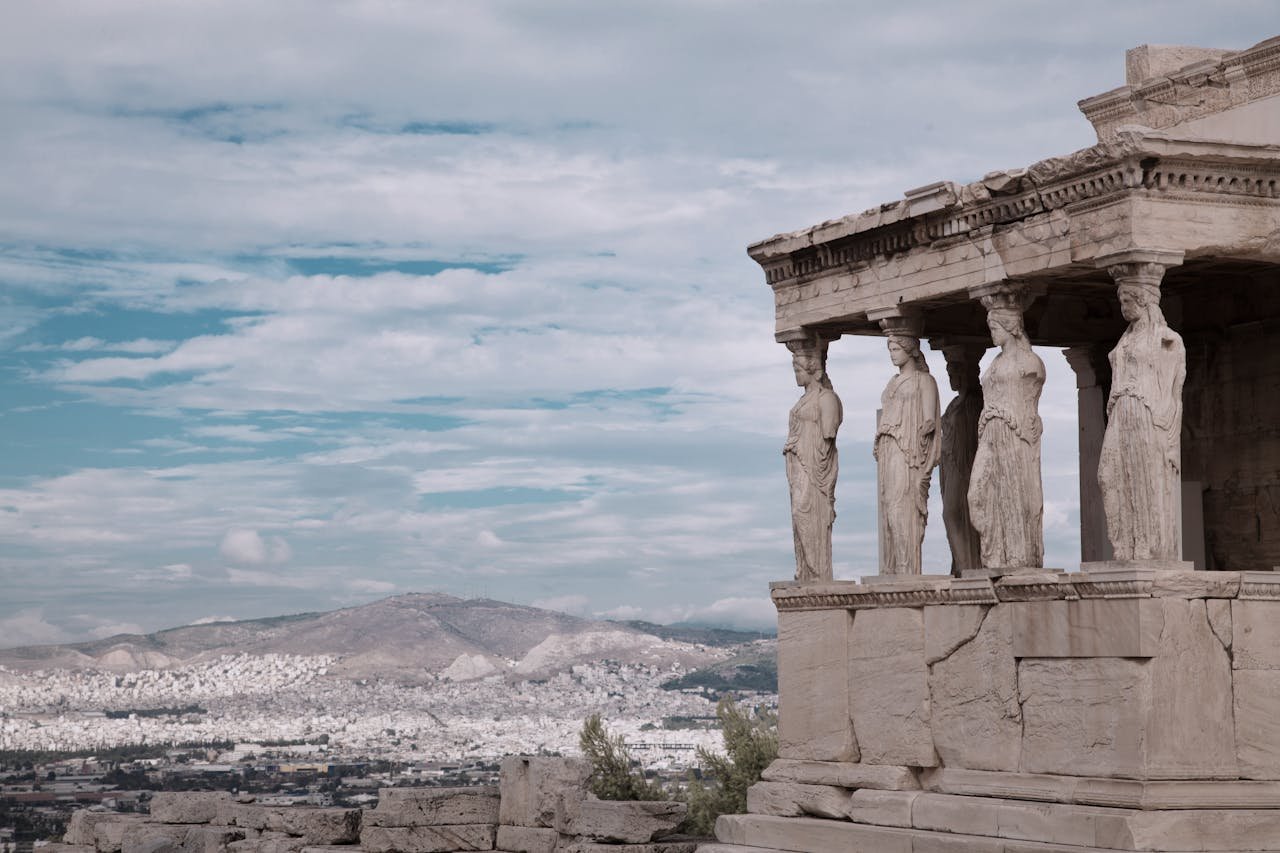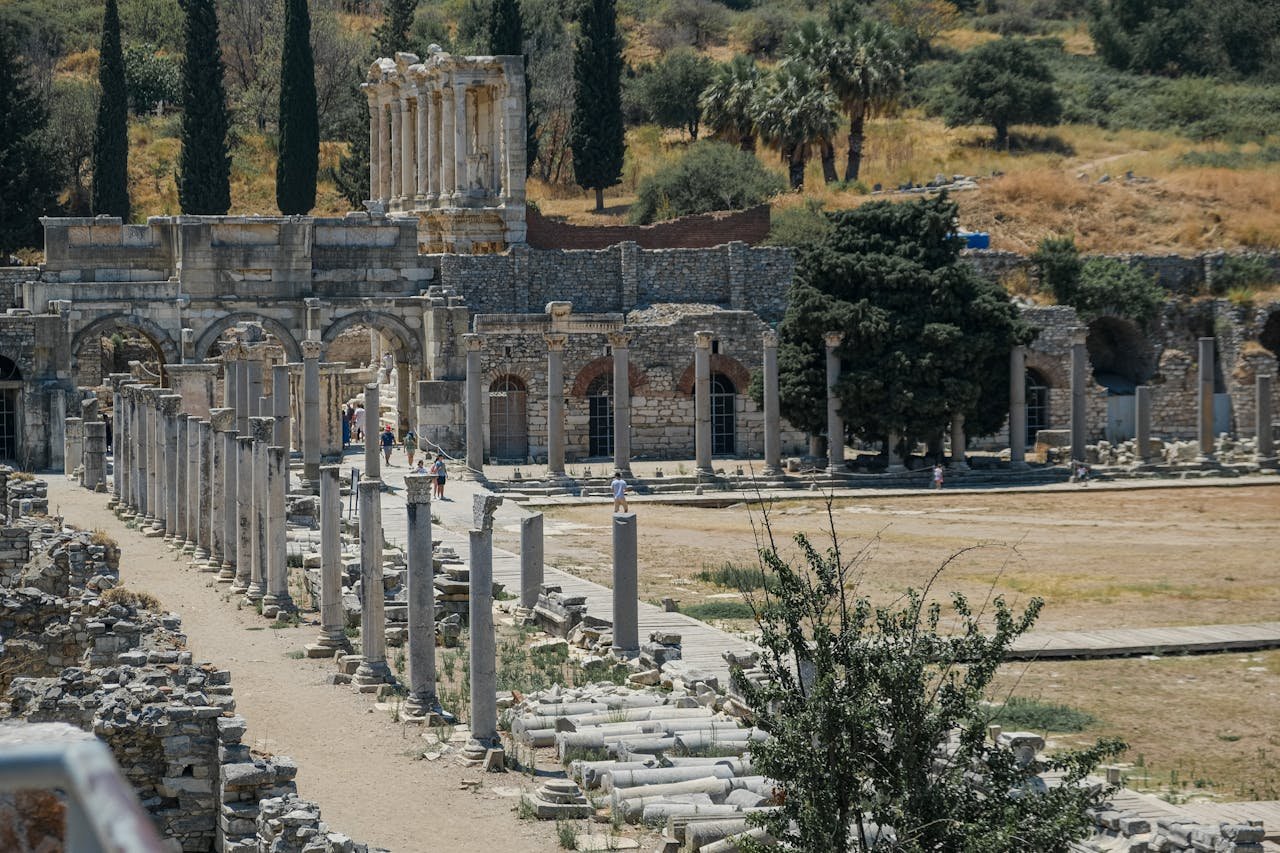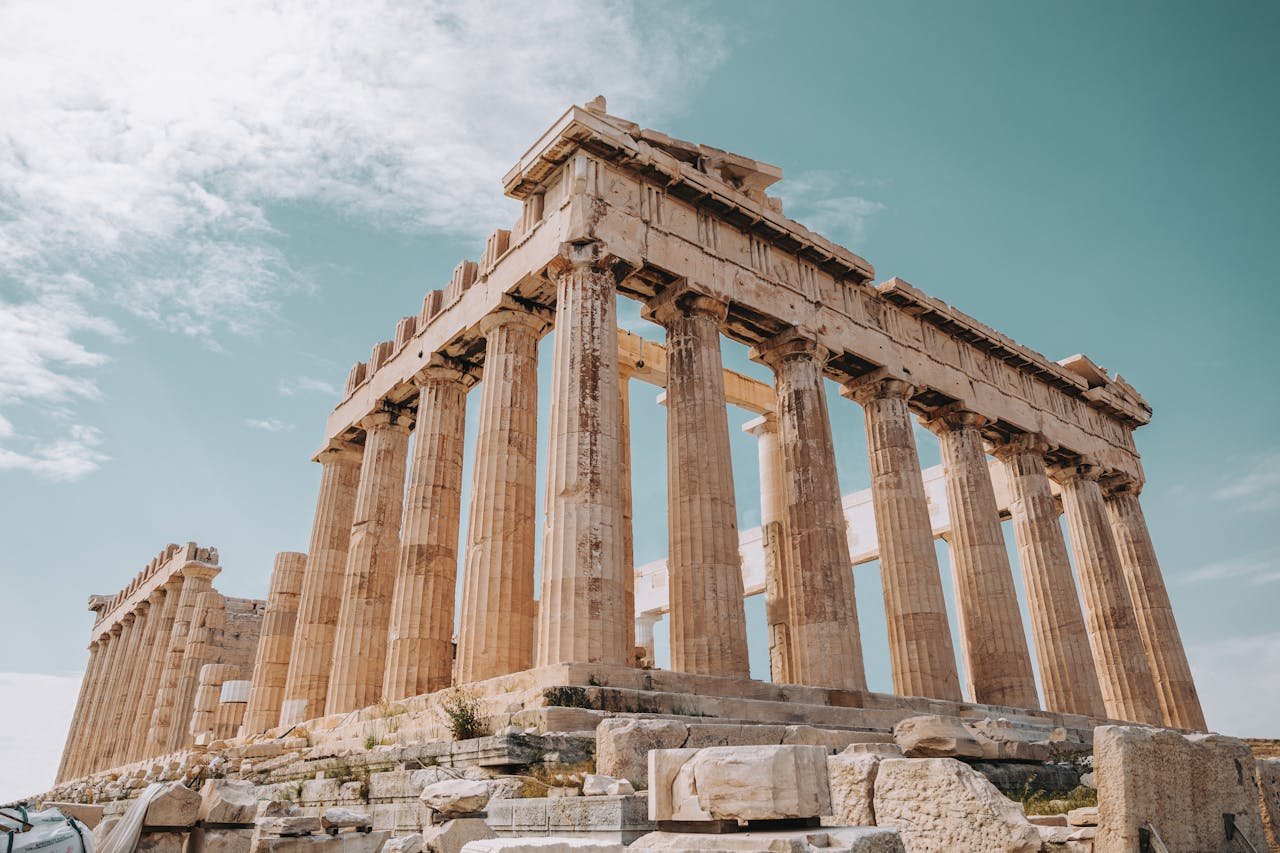Explore the ancient Greek civilization timeline in our overview. Discover key events and developments that shaped this historical era.
Ancient Greek Civilization Timeline Overview
Introduction
Ancient Greek civilization is a key part of Western culture. It has greatly influenced philosophy, art, and governance. This civilization lasted from the Minoans to the Golden Age of Athens. Its impact can be seen throughout history. Many city-states, invasions, and cultural exchanges shaped this time of great thought and creativity.
By looking into Greek mythology, the rise of democracy, and amazing architecture, we can see a world where gods lived with people. It was also a time when great thinkers explored deep questions about life. Let’s take a journey to discover the wonders of Ancient Greece.
The Dawn of Greek Civilization
The start of Greek civilization is an important time that includes the Stone and Bronze Ages. These periods built the foundation for the great cultures of the Minoans and Mycenaeans. The Stone Age showed slow progress in tools and technology. In the Bronze Age, there was a big increase in craftsmanship and trade. The Minoans are famous for their impressive palaces and colorful paintings. The Mycenaeans are known for their strong citadels and epic stories. Together, they set the stage for the great ancient Greek civilization that would follow.
Introduction to the Stone and Bronze Ages
Ancient Greece went through the Stone and Bronze Ages. These were important times with big changes and cultural growth. The Stone Age had basic tools and farming practices. This period helped people start building society. Then, in the Bronze Age, they discovered bronze. This changed how they worked with metal and improved trade. Each age helped make the ancient Greek civilization more advanced. They laid the foundation for the amazing cultural achievements that would come later. The Stone and Bronze Ages are key parts of Greek history. They shaped the identity of Greece for many years.
The Significance of Minoan and Mycenaean Cultures
The Minoan and Mycenaean cultures played an important role in shaping Ancient Greek civilization. The Minoans, famous for their beautiful palaces, art, and sea trade, lived on the island of Crete. The Mycenaeans, from mainland Greece, had strong fortresses and a warrior culture. They helped set the stage for Greek city-states and the rise of Classical Greece. Both cultures brought important things like writing, building styles, and religious practices that became key parts of Ancient Greek culture.
Timeline for Greek Civilization
Timeline for Greek Civilization:
| Archaic Period | Classical Period |
| 800-500 BC: | 500-323 BC: |
| – Emergence of city-states in Greece | – Height of Athenian democracy and the Golden Age of Athens |
| – Development of Greek alphabet | – Peloponnesian War between Athens and Sparta |
| – Introduction of Olympic Games | – Conquests of Alexander the Great leading to the spread of Hellenistic culture |
| – Rise of Greek colonies in Asia Minor | – Philosophical advancements by Socrates, Plato, and Aristotle |
| – Flourishing of arts, architecture, and theater in Greece |
The Dark Ages and the Archaic Period
After the Mycenaean civilization fell apart, Ancient Greece entered a time called the Dark Ages. During this time, there were fewer people and less cultural activity. This period set the stage for the Archaic Period that followed. The Archaic Period was a time when Greek civilization started to come back to life.
In this period, city-states began to develop. There were also new colonies formed in the Mediterranean. People started to create political systems that were more democratic. At this time, there were important improvements in art, literature, and trade. These changes helped to shape early Greek society.
Rebirth after the Collapse: The Greek Dark Ages
Ancient Greece went through a hard time known as the Greek Dark Ages. During this time, people left and society fell apart. But then, things got better. A new and advanced society started to grow. They improved farming methods and traded more. The Greeks began to rebuild city-states and returned to their strong sea trade. This was the start of a rich and powerful civilization. This time of change helped create the culture, politics, and ideas that we know from the Classical Period. This period has had a lasting impact on the legacy of Ancient Greece.
Foundations of a Civilization: The Archaic Period Explored
The Archaic Period in ancient Greece was a key time that started big changes. It came after the Greek Dark Ages. During this time, there were big improvements in politics, trade, and art. City-states like Athens and Sparta began to form their own identities. This set the stage for the later Classical Period. Colonization also grew, spreading Greek influence around the Mediterranean. This sharing of ideas helped culture and learning to grow. The art and buildings from this period showed new skills and hinted at the great things to come.
The Golden Age: Classical Greece
The Golden Age of Classical Greece stood out for its amazing cultural achievements in the 5th century BC. During this time, Athens was at its strongest, making big strides in democracy, philosophy, and the arts. Key events like the Persian Wars, especially the Battles of Marathon, Thermopylae, and Salamis, helped the Greek people stay strong together against outside threats. This period also saw great thinkers such as Socrates, Plato, and Aristotle, who helped shape Western philosophy. Artistic wonders like the Parthenon and stunning sculptures from this time still inspire many people today.
The Persian Wars: A Turning Point for Greek City-States
The Persian Wars were a turning point for the Greek city-states. These wars were mainly fought between the Greeks and the Persian Empire. They showed how strong and united the Greeks could be against a common enemy. Winning key battles like Marathon, Thermopylae, and Salamis made the Greeks feel proud. This pride helped them build closer ties. After the wars, they formed the Delian League. This group showed their unity and helped Athens become a powerful city in the area.
Democracy, Philosophy, and the Arts: The Height of Athenian Power
During the Golden Age, Athens became a center for culture and learning in ancient Greece. Democracy grew strong thanks to leaders like Pericles, encouraging people to take part in government. Famous philosophers like Socrates, Plato, and Aristotle helped shape Western philosophy. Their ideas would influence many future thinkers. The arts also thrived, with playwrights like Euripides and historian Thucydides telling stories about the Peloponnesian War. This time was marked by a mix of democracy, philosophy, and arts that showed the height of Athenian power.
The Macedonian Era and the Hellenistic Period
Alexander the Great was the King of Macedonia. He played an important role in changing the Macedonian era and starting the Hellenistic period. His conquests spread Greek culture across Asia, Africa, and Europe. This mix merged Greek traditions with local ways of life. The Hellenistic world saw a blend of art, philosophy, and science. Alexandria became a hub of learning during this time. The spread of Greek ideas reached faraway lands and greatly impacted civilizations outside of Greece. Alexander’s empire created a base for the rich culture of the Hellenistic period.
From Philip II to Alexander the Great: The Rise of Macedonia
Philip II of Macedonia set the stage for his son, Alexander the Great, to take over and conquer many lands. He united the many struggling Greek city-states. Philip had new military ideas and wanted to expand their power. His efforts led to Alexander’s famous campaigns in Asia, Africa, and Europe. Together, they used the strong Macedonian army, known for its phalanx formation and cavalry, to change the political scene of the ancient world. After Philip was killed in 336 BC, Alexander became king and worked to make his dream of Hellenistic power come true. His rule stretched from Greece to India and helped make Macedonia a key power in ancient history.
The Spread of Greek Culture: The Hellenistic World
During the Hellenistic period, Greek culture spread a lot after Alexander the Great’s conquests. It spread across the Mediterranean, into Asia, and into Egypt. This time mixed Greek traditions with local customs. This mix created a varied cultural landscape called the Hellenistic world.
Cities like Alexandria became important places for learning and culture. They welcomed scholars, philosophers, and artists from many areas. This sharing of ideas changed art, architecture, philosophy, and language. It made a long-lasting mark on places influenced by the Hellenistic culture. The spread of Greek culture in this period set the stage for mixing different traditions.
Buy Amazon- A Brief History of Ancient Greece
Buy Amazon- Concise Survey of Greek History
Dress Code Ancient Greek Civilization
Greek civilization is renowned for its elegant and timeless attire worn by both men and women. In ancient Greece, men typically wore a chiton, which was a simple tunic made of a single piece of fabric draped over the body and fastened at the shoulders with pins or brooches. They often paired this garment with a himation, a larger cloak or shawl, for added warmth and to denote status.
Women in ancient Greece commonly wore a peplos, a long, draped garment cinched at the waist with a belt. Another popular attire for women was the chiton, similar to that of men but sometimes more intricately decorated. Over these garments, women would also wear a himation for additional coverage and style.
Both men and women adorned themselves with jewelry such as earrings, necklaces, bracelets, and rings made from precious metals and gemstones. Sandals were the typical footwear for both genders.
The clothing of ancient Greek civilization not only reflected their culture but also showcased their craftsmanship and attention to detail in drapery and design.
Read more- Ancient Rome Timeline and History
The Influence of Rome
The Roman influence on ancient Greece was very strong. It marked the time when Greek power started to fade. As Rome grew, Greek culture entered a new phase under Roman control. The Romans took many parts of Greek life and changed them to fit their own ways. This mix of cultures created new styles in architecture, different themes in literature, and new religious practices in the area. The rich history of ancient Greece kept growing with help from Rome. This helped shape the growth of Western civilization. Rome’s takeover played an important role in the history of both empires. It left a big mark on the Mediterranean world.
Roman Conquest: The End of Greek Dominance
The Roman conquest was the end of Greek power in the ancient world. As the Roman Empire grew, it came into contact with the remaining Greek city-states and areas. Eventually, Rome absorbed these regions into its large empire. This led to a big change in power, with Rome becoming the main power in the Mediterranean. Even though Greek culture and influence continued under Roman rule, the time when Greece had its own political control and strength was over.
Greek Culture under Roman Rule: A New Chapter
Under Roman rule, Greek culture changed a lot. It mixed with Roman traditions to form something unique. The Romans loved Greek philosophy, art, and literature. They adopted and modified these aspects in their own society. During this time, ideas flowed freely as Greek thinkers met with Romans. This helped both cultures grow. The Greek language became popular in the eastern parts of the Roman Empire. Its influence spread into everyday life. This time was important for sharing cultures, affecting the future of Western civilization.
Exploring Key Greek Civilizations
Sparta was known for its strong military and strict discipline. It was an important part of ancient Greek civilization. Athens, where democracy began, had a rich culture and many ideas. Thebes enjoyed a short time of greatness under Epaminondas but also faced problems from other city-states. Each of these key Greek city-states added something special to the story of ancient Greece. They showed different ways of life and values. Sparta, Athens, and Thebes highlight the unique and varied nature of Greek civilization.
Sparta: A Warrior Society
Sparta was famous for its strong military and showed what a warrior society looked like in ancient Greece. The lives of Spartans focused on discipline, following rules, and staying fit. Young boys in Sparta started tough military training when they were very young. This made them strong soldiers. The whole society in Sparta placed military power above everything. Citizens became fierce fighters who were committed to protecting their homeland. Sparta’s focus on the military affected all parts of life, putting duty to the state and the group before personal goals.
Athens: Birthplace of Democracy
Athens is known as the birthplace of democracy. It played an important part in shaping the politics of ancient Greece. The Athenian democracy started in the 5th century BC. It let citizens take part in decisions, moving away from one-person rule. This system focused on equality and helped people get involved. It set the stage for the democratic ideas we have today. Athens also became a center for thinking and culture. It was home to famous philosophers, playwrights, and artists who all helped build ancient Greek civilization.
Thebes: A Brief Period of Glory
Thebes was a city in ancient Greece. It had a short but important time of success. Thebes was known for its strong military and its strategic location. The city became well-known thanks to leaders like Epaminondas and Pelopidas. Thebes played a big role in the Boeotian League. It won battles against Sparta, showing its military power and skill. Even though its time of strength did not last long, Thebes made a mark on Greek history. Later, it lost power because of fights within the city and pressures from outside.
Significant Battles and Conflicts
The history of ancient Greece is full of important battles and conflicts that changed the way of civilization. One famous event is the brave fight of King Leonidas and his 300 Spartans at Thermopylae. Another key moment is the big naval win at Salamis. These events show the strength and smart strategies of the Greek forces. The Peloponnesian War was a long fight between Athens and Sparta. It showed the problems of inside conflicts and outside dangers. These battles help us understand the military plans, friendships, and rivalries that shaped ancient Greek history.
Marathon, Thermopylae, and Salamis: Defining Battles
The battles of Marathon, Thermopylae, and Salamis are very important in ancient Greek history. In 490 BC, the Athenians won at the battle of Marathon, which helped them keep their freedom from the Persians. At Thermopylae in 480 BC, King Leonidas led a small group of Spartans against the much larger Persian army. This battle stands as a brave example of courage and sacrifice. In the same year, the naval Battle of Salamis was led by Themistocles. It showed how strong the Greek navy was compared to the Persians, changing the direction of the Persian Wars and showing how smart the Greeks were in their plans.
The Peloponnesian War: Athens vs. Sparta
The Peloponnesian War was a major fight between Athens and Sparta in ancient Greece. It lasted about 27 years and showed the fight for power between these two top city-states. Athens, with its strong navy, battled against Sparta, which had a powerful army. In the end, Athens declined, and this marked the end of the Golden Age of Athenian democracy. This long war changed the political scene in Ancient Greece and affected how power worked in the region.
Buy From Amazon- Greek History and Mythology
Buy From Amazon- Ancient Greece: From Prehistoric to Hellenistic Times
Philosophers, Thinkers, and Contributors
Socrates, Plato, and Aristotle are important figures in Western philosophy. They have influenced thinking for many years. Their ideas about ethics, politics, and metaphysics still matter today. In math and engineering, Archimedes and Euclid helped a lot. They improved knowledge in geometry and physics. These thinkers built a strong foundation for modern science and philosophy. Their thoughts go beyond time, encouraging more learning and exploration.
Socrates, Plato, and Aristotle: Pillars of Western Philosophy
Socrates, Plato, and Aristotle are the key figures in Western philosophy. Socrates is known for his method of questioning. He pushed people to examine their beliefs and assumptions. Plato was his student, and he studied the nature of reality. He focused on metaphysics and his theory of forms. Aristotle, another major thinker, contributed to logic, ethics, and biology. He had a huge impact on Western philosophy. Together, their work set the foundation for both ancient Greek philosophy and modern thought. This makes them important figures in human thought history.
Archimedes and Euclid: Shaping Mathematics and Engineering
Archimedes and Euclid were important people in ancient Greek mathematics and engineering. Archimedes is known for his work in geometry and mechanics. He came up with ideas still used today, like the principles of buoyancy and the Archimedes screw. Euclid, often called the “father of geometry,” wrote the Elements. This book is a key piece of math text that shaped mathematics for many years. Their work helped build the basics for today’s math and engineering. It shows how advanced the ancient Greek civilization was in knowledge and innovation.
Mythology and Religion
Ancient Greek mythology and religion are important parts of their culture. They shaped beliefs, rituals, and the way people lived. The gods and goddesses, led by Zeus, ruled from Mount Olympus. They affected every part of life. Heroes like Heracles and Theseus represented good qualities and faced great challenges. Epic stories, such as Homer’s Iliad and Odyssey, showed courage and fate. These myths helped explain nature and offered moral lessons. They gave people insight into what it means to be human. The ancient Greeks celebrated with festivals and sacrifices to honor their gods. They sought blessings and protection in a world where they both feared and respected divine power.
Olympian Gods and Goddesses: The Pantheon of Ancient Greece
The ancient Greek pantheon was a colorful mix of gods and goddesses that fascinated the people. Zeus was the strong leader of Mount Olympus, with powerful friends like Athena, Apollo, and Aphrodite by his side. Each god and goddess represented different parts of life and nature, such as wisdom, war, love, and beauty. The stories about them connected to human life helped Greeks understand the world and gave guidance for facing challenges. Today, these myths still influence art, literature, and even common sayings.
Heroes and Legends: Heracles, Theseus, and the Epic Traditions
Legends like Heracles and Theseus are very important in Ancient Greek mythology. Heracles is famous for his amazing strength. He performed the Twelve Labors, which showed his skill and bravery. Theseus, on the other hand, is known for killing the Minotaur, showing his cleverness and courage. The stories of their adventures were popular in ancient Greece. They represented the victory of good over tough challenges. These great tales formed the base for many hero stories and moral lessons in Greek culture. The adventures of these famous heroes still attract people today, showing how lasting the legacy of Ancient Greek heroes is.
Daily Life in Ancient Greece
Ancient Greek life followed a clear social order. Only men could be citizens, while women and foreigners had fewer rights. Slavery was common, which gave citizens free time to focus on culture and learning. The economy was strong due to farming, trading, and skills in crafting. Women took care of the home, while men participated in politics and the military. Community was important, with many festivals and religious events. Education was important for the wealthy, mostly covering rhetoric, philosophy, and math.
Social Hierarchy and Citizenship
In Ancient Greece, society was organized in a clear order. At the top were citizens. These were mostly land-owning men who had full rights and responsibilities. Next were metics. They were foreign residents but had limited rights. Slaves were at the bottom. They had no personal freedom. Citizenship was important. It gave people the chance to take part in politics and provided protection by the law. This status decided what rights and duties a person had in the community. It showed the complex structure of the Greek civilization.
Economy, Trade, and Slavery
Economic strength in ancient Greece came from many areas, such as farming, trade, and crafts. Trade routes crossed the Mediterranean Sea and helped with business, making city-states like Athens and Corinth wealthier. The slave population was very important for farming and other parts of the economy. Slaves were often obtained through war, piracy, or owing money. Even though slavery had its dark sides, it played a big role in the wealth of ancient Greek civilization.
Women in Ancient Greece: Roles and Rights
Women in ancient Greece had important roles, even in a society run by men. They mostly focused on home tasks, taking care of families and children. Most did not have citizenship rights. However, women from Sparta had more freedom and rights than others. In Athens, women had little power and were mainly seen as wives and mothers. Still, some women made a name for themselves in areas like poetry, philosophy, and governance. Their lives show the mix of cultural rules and personal strength in ancient Greek society.
Buy Book from Amazon- Ancient Greece: An Illustrated History
Book Amazon- History of Greece: An Enthralling Overview of Greek
Art, Architecture, and Science
Classical Greece was great at art, buildings, and science. They showed amazing creativity and new ideas. Greek sculptures and pottery were simply beautiful, featuring fine details and realistic forms. Big structures like the Parthenon and old theaters showed their building skills and cultural beliefs. Smart people like Archimedes and Euclid made big strides in math and technology. The Greeks mixed art, buildings, and science well in their society. Their influence still matters in these areas today.
Classical Beauty: Sculpture and Pottery
Ancient Greek art is famous for its beautiful style. This is seen well in their amazing sculptures and pottery. Sculptures such as the Venus de Milo and the Discobolus show how skilled the Greeks were at representing the human body with detail and elegance. In pottery, methods like black-figure and red-figure painting created detailed images on vases. These images show stories from myths and scenes from daily life. The artwork not only looked great but also showed the important ideas and beliefs of ancient Greek civilization. The mix of creativity and skill in Greek art still inspires many people and captivates art lovers around the world.
Architectural Marvels: From the Parthenon to the Theaters
Ancient Greek architecture is famous for its amazing buildings that continue to impress people today. The Parthenon, which is dedicated to the goddess Athena, is a symbol of beauty and skill. This Doric temple is located on the Acropolis in Athens and represents the high point of Greek building accomplishments. The theaters, such as the Theater of Epidaurus, show how advanced ancient Greeks were in sound and design. These open-air venues were places for culture and art, hosting plays and festivals that were important to the social life of ancient Greek civilization.
Innovations in Science and Technology
Ancient Greek civilization made great progress in science and technology. They laid the foundation for future innovations. Pythagoras made important discoveries in math. Archimedes created useful devices like the screw pump and compound pulleys. Euclid’s book “Elements” changed the way we look at geometry. It gave us a clear method that we still use today. The Greeks also studied astronomy. Hipparchus was the first to introduce latitude and longitude. These advances in science and technology changed their society and impacted knowledge worldwide. Their quest for learning set a path for those who came after them.
Sporting Events and the Olympics
The ancient Greeks loved being strong and skilled. This is shown in the famous Olympic Games. These games took place in Olympia and included many sports like running, wrestling, and chariot races. The Greeks thought being good at sports brought honor and glory. Winning was seen as proof of hard work and strength. The Olympic Games started in 776 BC and became a symbol of unity among Greek city-states. Athletes from all parts of Greece came together to show their skills and enjoy friendly competition.
Origins of the Olympic Games
The Olympic Games started in ancient Greece, especially in Olympia, located in the Peloponnese area. These games were both a religious and sports festival to honor Zeus, who was the king of the gods. At first, the Olympics included events like running, long jump, discus throw, wrestling, and chariot races. There was a tradition called the Olympic truce that allowed athletes and fans to travel safely from different areas. The Games were very important culturally and encouraged friendly competition between Greek city-states.
Ancient Competitions and Athletic Feats
The ancient Greek society greatly valued physical strength and skill in sports. This led to the creation of important competitions, such as the Olympic Games. These games symbolized Greek sportsmanship and unity. They gathered different city-states in friendly competition. Athletes competed in various events like running, wrestling, discus throwing, and chariot racing. Winning these contests brought honor to the athletes and increased the pride of their cities. It also built a sense of togetherness and pride among the Greeks.
Greek Literature and Theatre
Greek literature and theatre in ancient Greece were very important to their culture. Epic poems like The Iliad and The Odyssey by Homer set the stage for Western literature. Tragedy and comedy grew in theaters and changed modern drama a lot. Playwrights such as Euripides and Sophocles wrote plays that explored human nature and morality. The shows in Athens during festivals like the Dionysia showed the democratic values of the city. Literature and theatre in ancient Greece mixed fun with deep thoughts, making a big impact on art around the world.
Epic Poems: The Iliad and The Odyssey
The famous poems, the Iliad and the Odyssey, written by the ancient Greek poet Homer, are important parts of literature. The Iliad talks about the Trojan War and shows the bravery and the tragedies that happen during the fight. On the other hand, the Odyssey tells the story of Odysseus and his difficult journey back home after the war. It highlights his cleverness and strength. These stories explore the deep issues of human nature, respect, and how the Greek gods are involved in the lives of humans. The beauty of the poems and their deep themes still attract readers today.
Tragedy and Comedy: The Influence on Modern Theatre
Tragedy and comedy from Ancient Greek theater set the stage for modern theater practices. Great playwrights like Sophocles and Aristophanes looked at deep human feelings and social problems. They changed how stories are told on stage. Tragedies focused on fate, pride, and tough choices, stirring strong emotions in the audience. Comedies, however, used humor and satire for social commentary. They showed the silly parts of daily life. The style and rules of Greek drama still affect today’s theater. This shows how much Ancient Greek culture still matters in art and expression.
The Decline of Ancient Greece
Internal conflicts and external powers led to the decline of ancient Greece. While city-states were in civil war, forces like the Roman Empire invaded Greek land. As Rome took over, Greek influence and self-rule weakened. The battles of Corinth and Pydna showed how Greece was becoming less powerful. Even with strong leaders like Demosthenes fighting against Macedonian control, Greece eventually fell under foreign rule. The proud civilization faced a new time under Roman power. This marked the end of an important era.
Internal Conflicts and the Rise of External Powers
Internal fights among the Greek city-states and ongoing battles for power made Ancient Greece less stable. At the same time, outside forces like the Persian Empire tried to take advantage of these internal issues to increase their control in the area. The Peloponnesian War made these internal problems worse and led to the decline of Greek civilization. As outside powers became stronger and got involved in Greek matters, the independence of the city-states suffered. This situation set up the shift into the Roman era.
Transition into the Roman Era
As ancient Greece faced problems from within and threats from outside, it slowly changed into the Roman era. The Roman Empire started to take the spotlight away from the once-flourishing Greek civilization. With Julius Caesar’s rise and Roman lands spreading, Roman culture began to weave into the Greek way of life. This change marked an important shift in power and cultural exchanges in the Mediterranean region. The legacy of ancient Greece continued to grow while under Roman rule. This left a lasting mark on the building of Western civilization.
Legacy of the Greek Civilization
The ancient Greek civilization has greatly shaped modern society. Their ideas about democracy and philosophy still influence Western culture today. We can see their impact in how buildings are designed all around the world. Many concepts in mathematics come from Greek thinkers like Pythagoras and Euclid. Greek mythology still inspires writers and artists all over the globe. The Olympics, which began in ancient Greece, represent unity and sportsmanship among countries even now. The Greek legacy shows the creativity and intelligence that continue to matter today.
Contributions to Modern Society
The contributions of Ancient Greece to our modern world are very significant. Their ideas help shape many areas, from philosophy to democracy. Great thinkers like Socrates and Aristotle laid down the rules of logic and reasoning, which form the foundation of Western thinking. The democratic ideas that started in Athens still affect governments around the world today. Additionally, Greek art and architecture continue to inspire how we design buildings and create art now. The Olympic Games, which began in Greece, represent global unity and sports excellence. The lasting impact of Ancient Greek civilization goes beyond time and helps form today’s society.
The Enduring Influence on Western Culture
The lasting impact of ancient Greek civilization on Western culture is deep and varied. Greek ideas have shaped important areas like philosophy, democracy, art, and literature. Concepts such as logic, ethics, and political systems come from the teachings of Greek philosophers like Socrates, Plato, and Aristotle. The building designs from ancient Greece still inspire modern structures, showing the lasting beauty and balance of Greek architecture. The heritage of ancient Greek culture is a major part of what forms Western civilization today.
Conclusion
Ancient Greek Civilization has had a big impact on the world. It started with the rise of city-states and reached its height during Classical Greece. The achievements of Alexander the Great also marked this time. Greek culture has shaped many areas, including architecture, philosophy, democracy, and the arts. Even though the Roman Empire later took over, the influence of the Greeks still remains strong. Today, we can see how Ancient Greek Civilization affects our society and Western culture. This shows how important and lasting this great civilization is.
Frequently Asked Questions
What was the timeline of Ancient Greek civilization?
Explore the timeline of ancient Greek civilization. Start from the Stone and Bronze Ages, then move to the Classical Golden Age. Look into the Macedonian era and Roman influence, too. Learn about important cities like Sparta and Athens. Discover the key battles, famous philosophers, and everyday life. See the achievements in art and architecture. Find out about the origins of the Olympics and the impact of their literature. Finally, understand their lasting legacy.
How did Greek civilization influence the Roman Empire?
Greek civilization had a big impact on the Roman Empire. This influence showed up in many areas like architecture, philosophy, art, and governance. Roman rulers liked Greek building styles and ideas. They also used Greek art methods and some democratic ideas. This sharing of culture helped shape Rome’s growth and made it grand.
What were the major periods of Ancient Greek history?
The main times in ancient Greek history are as follows:
- The Stone and Bronze Ages
- The Minoan and Mycenaean cultures
- The Dark Ages
- The Archaic Period
- Classical Greece
- The Macedonian Era
- The Hellenistic Period
- Roman influence
Other important parts include key Greek civilizations, major battles, famous philosophers, mythology, daily life, art and science, the Olympics, literature, and theater.
Who were some of the most influential figures in Ancient Greece?
Some important people from ancient Greece are Socrates, Plato, and Aristotle in philosophy. In mythology, we have Heracles and Theseus. For history, notable figures include Pericles and Alexander the Great. Their work helped shape Western civilization.
How did democracy originate in Ancient Greece?
Democracy started in ancient Greece, specifically in Athens, around the 5th century BCE. In this system, citizens could directly participate in decisions. This way of governing helped shape the basics of modern democracy.









